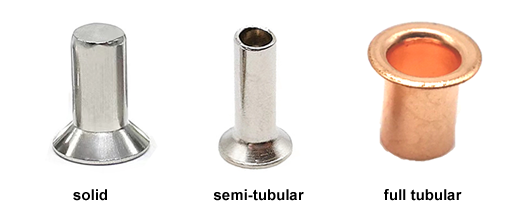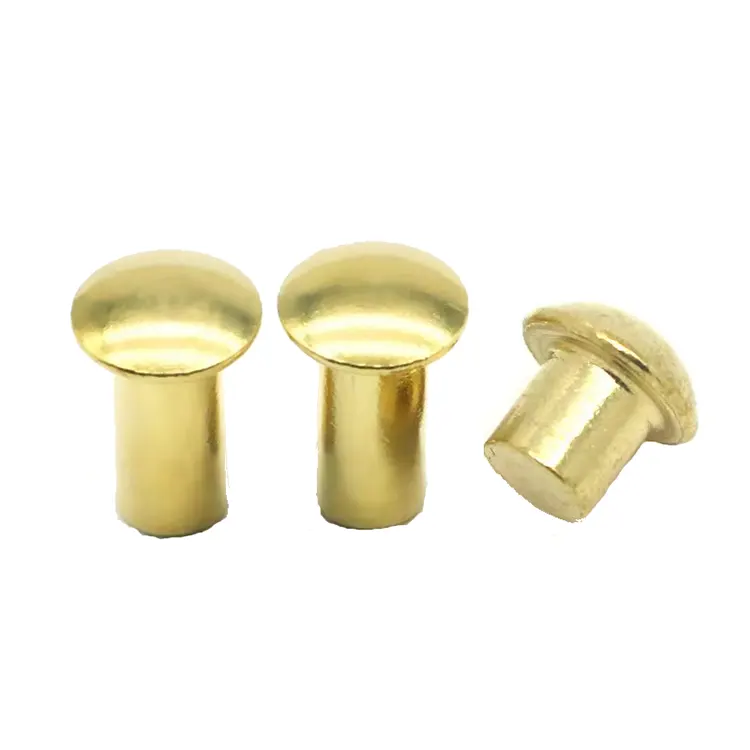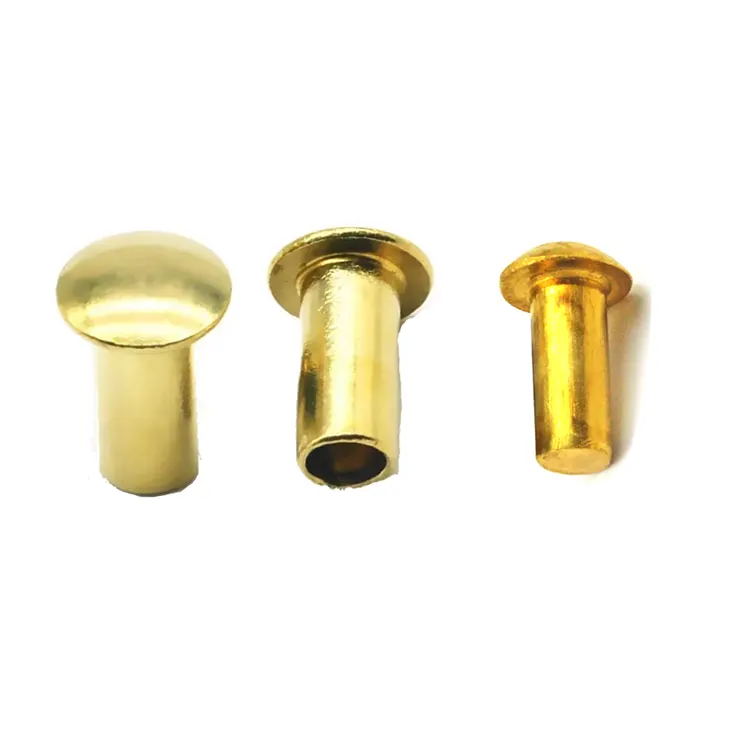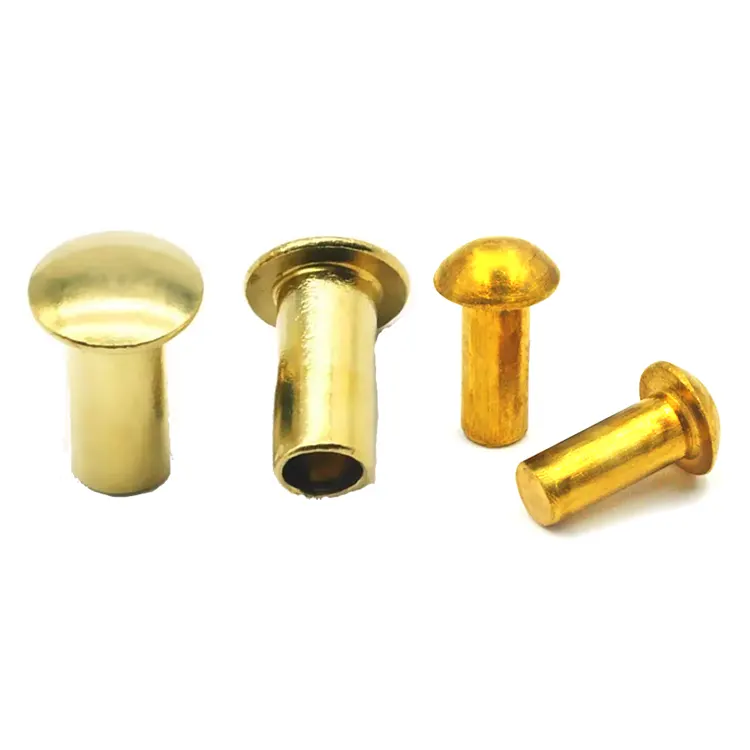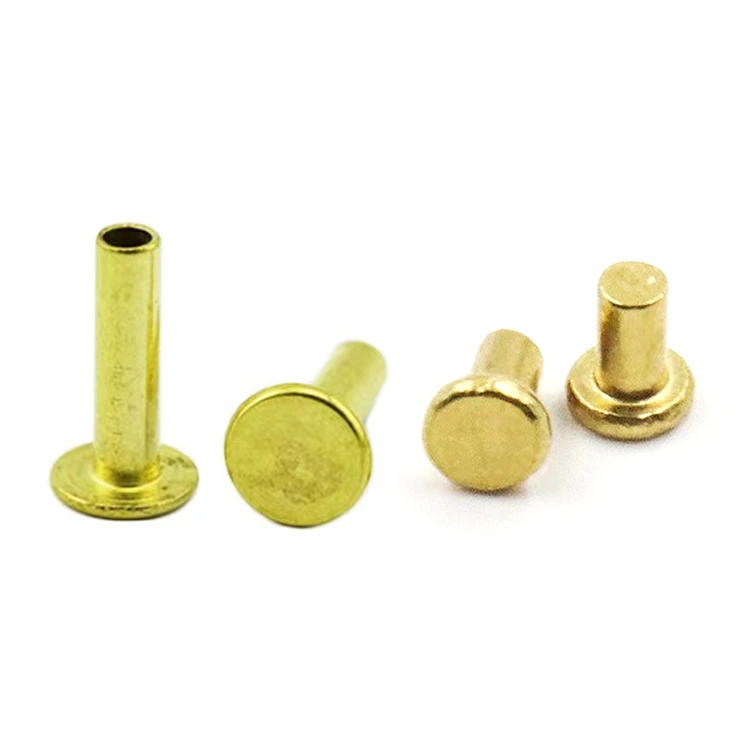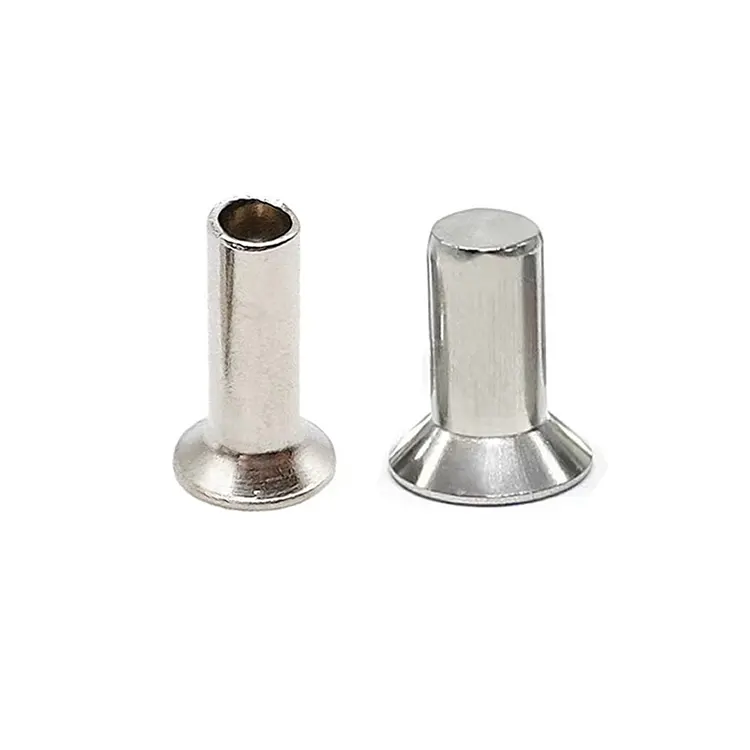Rivets
As one of professional manufacturer in China, Notin would like to provide you Rivets. And we will offer you the best after-sale service and timely delivery.
What is a rivet?
A rivet is a permanent mechanical fastener used to join two or more materials. Rivets work by inserting a metal pin into an aligned hole and deforming the end, creating a strong, secure, and durable connection. Unlike temporary fasteners like screws, rivets do not rely on threads, but instead form a permanent connection, making them ideal for applications requiring high strength, durability, and vibration resistance.
Classification of Rivets
Rivets are typically categorized by head shape, degree of hollowness, or material.
Based on head shape, rivets can be classified as flat head rivets, round head rivets, countersunk head rivets, mushroom head rivets, universal head rivets, truss head rivets, etc.

Based on degree of hollowness, rivets can be classified as solid rivets, semi-tubular rivets, or full tubular rivets.
Based on material, rivets can be classified as brass rivets, stainless steel rivets, steel rivets, aluminum rivets, copper rivets, etc.
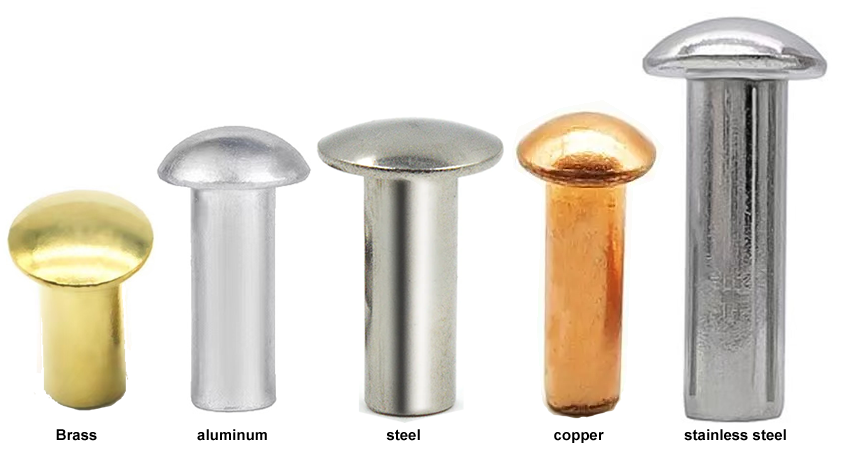
What surface finishes are available for rivets?
Rivet surfaces are typically treated with rust-proofing treatments, primarily electroplating, including zinc plating, nickel plating, chrome plating, tin plating, gold plating, and silver plating. Electroplating is a common rust-proofing method for rivets. It applies a layer of plating to the rivet surface through physical or chemical methods. The plating effectively prevents corrosion and rust, while also providing a certain aesthetic effect.
Another special surface treatment method is head coating. Head coating is performed after the rivet is electroplated. This allows for a variety of colors on the rivet head, achieving an aesthetically pleasing finish.
Aluminum rivets cannot be electroplated, but they can be anodized. Anodizing also allows for a variety of color options, but the unit price is higher than electroplating.
Rust-proofing the rivet surface is crucial, effectively extending the rivet's service life and ensuring a secure connection. Different rust-proofing methods are suitable for different environments and applications, so the choice should be tailored to the specific situation.
- View as
Brass Round Head Rivets
Nuote Metals specializes in the production and sale of brass round head rivets. We are located in Dongguan, China, a city with a strong industrial development. Our copper semi-bulgy head rivets consist of a shank and cap made of brass alloy. The semi-bulgy head design provides uniform pressure distribution, preventing damage to the joint surface. They are characterized by their combined electrical conductivity and corrosion resistance, simple construction, easy installation, high reliability, and long service life.
Read MoreSend InquiryBrass Rivets
Nuote Metals produces brass rivets in China, brass rivets are primarily made of a copper and zinc alloy, a material that offers a range of advantages. Brass' excellent corrosion resistance allows it to withstand long-term use in humid environments without rusting, making it suitable for outdoor use or in high-humidity conditions. Brass also possesses strength and hardness, allowing it to withstand mechanical stress while maintaining good toughness and resisting breakage. Brass also has excellent electrical and thermal conductivity, making it suitable for use in electronic and thermal equipment. Brass' smooth surface allows for easy electroplating or polishing, enhancing its aesthetics. These properties make brass rivets a preferred choice across many industries.
Read MoreSend InquiryBrass Pan Head Rivets
Nuote Metals specializes in the production of brass pan head rivets. Our rivets are made of H65 brass, which has a high brass content, is soft and easily formed, and is less likely to crack during the riveting process. Brass pan head rivets consist of a head and a shank, with the shank being hollow for approximately half its length. During installation, the rivet is inserted into a pre-drilled hole. Using a specialized riveting machine and punch, the end of the shank expands and forms the head on the other side, creating a clamping connection. This process relies on plastic deformation of the metal, eliminating the need for welding or adhesives, making it simple and efficient.
Read MoreSend InquiryBrass Mushroom Head Rivets
Brass mushroom head rivets consist of a head and a body. The head is round and slightly flattened, resembling a mushroom cap. The body is semi-hollow, meaning it has a hole in the center but doesn't go completely through. These are called brass semi-hollow mushroom head rivets. Some rivets have a solid body, called brass solid mushroom head rivets. During installation, a specialized tool is used to insert the body into the pre-drilled hole. Pressure is applied to deform the body, causing it to expand and grip the material, creating a secure connection. Nuote Metals specializes in producing these brass mushroom head rivets.
Read MoreSend InquiryBrass Flat Head Rivets
Brass flat head rivets are metal rods with a cap on one end. They achieve riveting through deformation or interference fit and are a common fastener. The flat head design reduces surface protrusions, making it suitable for applications requiring high flatness. The corrosion resistance of brass ensures connection stability even in humid and corrosive environments. Nuote Metals specializes in the production of brass flat head rivets. We have thousands of molds and can produce a variety of rivet specifications. We also support custom designs and samples.
Read MoreSend InquiryBrass Countersunk Head Rivets
Brass countersunk head rivets primarily consist of a head and a shank. The countersunk head allows for flush installation with the workpiece surface, eliminating protrusions that could affect appearance or function. The semi-hollow shank deforms during the riveting process, achieving a connection. This design not only improves installation efficiency but also enhances connection reliability. Nuote Metals specializes in the manufacture of brass countersunk head rivets, boasting high precision and a smooth, scratch-free surface. We welcome friends from all over the world to visit our company and collaborate with us.
Read MoreSend InquiryWhat are the advantages of rivets over other fasteners?
1. Ease of Installation
Rivets are fast to install, and even fully automated for high-volume applications, resulting in a simple and efficient operation process.
2. Connection Reliability
The riveting process is standardized, with strict quality control, resulting in highly stable connections. Visual inspection allows for quick verification of connection quality.
3. Vibration and Impact Resistance
Rivets connect through deformation or interference fit, providing strong clamping force and excellent vibration resistance, capable of withstanding vibration and shock.
4. Low Cost
Rivets are easy to install and can be fully automated, saving significant labor costs.
What are the advantages and disadvantages of rivets made of different materials?
Aluminum Rivets
Advantages: Lightweight, reduces overall product weight, low cost, suitable for general civilian applications.
Disadvantages: Low tensile and shear strength, unsuitable for high-strength workpieces, prone to electrochemical corrosion when in contact with metals such as stainless steel.
Stainless Steel Rivets
Advantages: Strong corrosion resistance, high hardness, suitable for high-strength workpieces (such as marine equipment)
Disadvantages: Higher cost, typically more expensive than aluminum rivets of the same specification.
Brass and Copper Rivets
Advantages: Excellent conductivity (such as connecting electronic components), good corrosion resistance.
Disadvantages: Higher cost, more difficult to process.
Steel Rivets
Advantages: High hardness, high connection reliability, and wide applicability.
Disadvantages: Compared to other materials, iron rivets are more prone to rusting.
What are the main applications of rivets?
Rivets have a wide range of uses, from small items like a pair of scissors to large items like airplanes and ships, as well as in high-precision medical applications.
Industrial Manufacturing
Rivets are used in a wide variety of industrial fields, wherever there is a need to connect two or more materials.
Electronics
Rivets secure heat sinks and chips, providing both vibration damping and noise reduction, and are widely used in the cooling systems of electronic products such as computers and mobile phones.
Automotive
Rivets are widely used to connect components of automobile bodies and chassis, such as doors and hoods. Their lightweight and corrosion-resistant properties make them an indispensable joining method in automotive manufacturing.
Aerospace
In aircraft manufacturing, rivets are used to connect different fuselage components, such as wings and tailplanes. Millions of rivets create high-strength, corrosion-resistant joints. Aluminum and titanium alloy rivets are often used to connect components of corresponding materials, ensuring stability in extreme environments.
Rivets are used everywhere. The above examples only represent a small number of their applications. We see rivets everywhere in our daily lives, such as on scissors, folding beds, and strollers etc. Rivets can be customized to different sizes and materials depending on the application.
Nuote Metals has specialized in the rivet industry for over a decade. Our factory is located in Dongguan, a city known as the "World Factory," a city with a developed industry and convenient transportation. This allows us to respond quickly when acquiring raw materials and supporting surface treatments, meeting our customers' needs for quick access to samples and bulk orders. We produce 10 million rivets daily and have molds of various specifications, allowing us to produce rivets as small as 0.8mm and as large as 10mm. We welcome your inquiries and visits.






